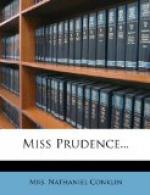“Who was it that stood on London Bridge and did not throw his manuscript over? Listen! Do you hear that grand child of yours asking who it was that sat by his hearth and did not toss his manuscript into the fire? Didn’t somebody in the Bible toss a roll into the fire on the hearth? I want you to come to talk to me. I want some one not wise or learned, except learned and wise in such fashion as you are, to sit here beside me, and look into the fire with me, and listen to the wind with me, and talk to me or be silent with me. If my book had been accepted, and all the world were wagging their tongues about it, I should want that unwise, unlearned somebody. That friend of mine over the water, sitting in his lonely bungalow tonight studying Hindoostanee wants somebody, too. Why did you not go with him, Prudence? Shall you never go with any one; shall you and I, so near to each other, with so much to keep us together, go always uncomforted. But you are comforted. You loved Helen, you love Linnet and Marjorie and a host of others; you do not need me to bid you be brave. You are a brave woman. I am not a brave man. I am not brave to-night, with that four-times-rejected manuscript within reach of my hand. Shall I publish it myself? I want some one to think well enough of it to take the risk.
“Prudence, I have asked God for something, but he gives me an answer that I cannot understand. Write to me and tell me how that is.
“Yours to-day and to-morrow.”
“J. H.”
* * * * *
“New York, Dec. 20, 18—.
“MY DEAR JOHN:
“I have time but for one word to-night, and even that cannot be at length. Linnet and I are just in from a lecture on Miss Mitford! There were tears running down over my heart all the time that I was listening. You call me brave; she was brave. Think of her pillowed up in bed writing her last book, none to be kind to her except those to whom she paid money. Linnet was delighted and intends to ‘write a composition’ about her. Just let me keep my hand on your arm (will you?) when evil impulses are about. You do not




